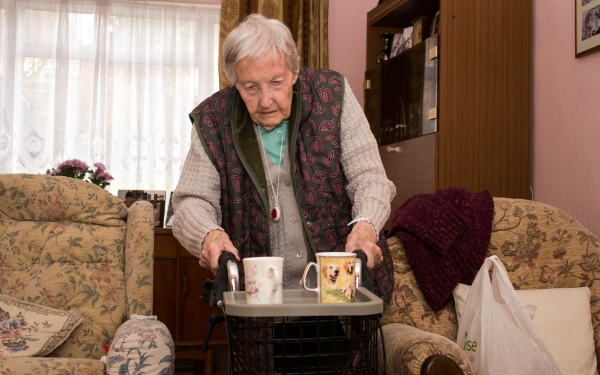
Social workers who work with older people will be expected to challenge “disempowering or ageist” services, under proposals for a new capabilities statement for staff working in this area.
The British Association of Social Workers (BASW) is consulting on the statement, which sets out the knowledge, skills and values expected of practitioners working with older people. The document will be supported by a continuing professional development (CPD) pathway, which will outline the roles that older people’s social workers may take on throughout their careers.
The capabilities statement sets an expectation that social workers who have completed their Assessed and Supported Year in Employment should be able to work confidently with older people. More experienced social workers will be expected to demonstrate in-depth knowledge of ageing, including health conditions and gerontological social work research and theory.
The capabilities statement adds to the requirements set out in existing frameworks, such as the Professional Capabilities Framework and standards issued by the HCPC. They are being developed because there is currently no set of capabilities for this specialist area of practice.
The statement and CPD pathway were commissioned by Lyn Romeo, the chief social worker for adults, and will be produced in partnership with social workers, older people, and carers.
BASW’s consultation closes at 5pm on Wednesday 26 April. Feedback can be sent to z.hoang@basw.co.uk.


 Bournemouth, Christchurch and Poole
Bournemouth, Christchurch and Poole  Hampshire County Council
Hampshire County Council  Lincolnshire County Council
Lincolnshire County Council  Norfolk County Council
Norfolk County Council  Northamptonshire Children’s Trust
Northamptonshire Children’s Trust  South Gloucestershire Council
South Gloucestershire Council  Wiltshire Council
Wiltshire Council  Wokingham Borough Council
Wokingham Borough Council  Children and young people with SEND are ‘valued and prioritised’ in Wiltshire, find inspectors
Children and young people with SEND are ‘valued and prioritised’ in Wiltshire, find inspectors  How specialist refugee teams benefit young people and social workers
How specialist refugee teams benefit young people and social workers  Podcast: returning to social work after becoming a first-time parent
Podcast: returning to social work after becoming a first-time parent  Podcast: would you work for an inadequate-rated service?
Podcast: would you work for an inadequate-rated service?  Family help: one local authority’s experience of the model
Family help: one local authority’s experience of the model  Workforce Insights – showcasing a selection of the sector’s top recruiters
Workforce Insights – showcasing a selection of the sector’s top recruiters 

 Facebook
Facebook X
X LinkedIn
LinkedIn Instagram
Instagram
Colleagues. Please forgive my only skimming through the paper referring to (a more inclusive term I much prefer as long retired social worker who is eighty this year) ‘people who are ageing.’ But it does seem to me, as in other fields of social work to these days, to have missed the importance of community social work. In my view this much neglected approach, still popular in parts of Scotland and certainly the States and Europe, is committed to working with, and not for, people and should be concerned with enabling, facilitating and thought-through Rogerian and other forms of advocacy which includes us all in the debate as equal players. One CMS skill here is Asset Based Community Development (ABCD) in which people are encouraged to be part of the problem-solving exercise. By consciously (re)-building our confidence to work with bureaucracies and institutions, reminding us we have considerable life and work experience, and being prepared to contribute our considerable community development knowledge to the common good. As opposed to a contemporary situation where, in my view, we are simply seen as increasingly redundant and displaced to the margins of a disinterested society. Again, recent thinking on Family Group Conference approaches is, as I understand it, being adapted to a range of social situations and surely at the end of our lives we have a considerable contribution to make in this and other areas. Lastly, without over-making my point the importance of peer relationships, being prepared to transfer power to key and natural leaders leaders in our communities, working from the grass-roots upwards and avoiding top-down decision making, re-claiming the Barclay Report, re-thinking holism and welcoming co-production,re-focussing on neighbourhoods, balancing individual, group and community work in a complementary way, learning about co-ordination, building on personalisation etc, etc are just some of the obvious ways forward if social work could remember that we still have a valid and usefullcontribution to make. In cameraderie. Peter Durrant. 01223 919448.